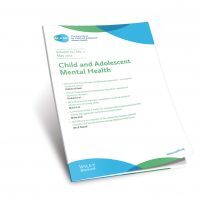Epidemiology
-

Eating Disorders: A Concern for All
Did you know that approximately 22% of children and adolescents worldwide show disordered eating? Eating Disorders Awareness Week (24 February – 2 March 2025) is an opportunity to improve awareness that anyone can have an eating disorder and explore the impact that eating disorders can have on children and young people.
This Eating Disorder Awareness Week, we encourage you to explore the FREE learning opportunities available on our website and ACAMH Learn, and to share with your networks.
Read more -

The STADIA Trial: Exploring clinical and cost effectiveness
Many children and young people with diagnosable mental health disorders are not receiving timely help, says new research.
Read more
Press release by The University of Nottingham for new paper published in the Journal of Child Psychology and Psychiatry by Kapil Sayal et al. -

Creating Positive Change through Self-Awareness and Expression
Children’s Mental Health Week (3 – 9 February 2025) serves as a fantastic opportunity to look further at how we can empower, equip, and give a voice to children and young people, as well as encourage positive change with regards to their mental health and well-being.
By focusing on ‘Know Yourself, Grow Yourself’, alongside our vision of ‘Sharing best evidence, improving practice’, and our mission to ‘Improve the mental health and wellbeing of young people aged 0-25’, we encourage you to focus on how we, as a society, can help encourage children and young people to feel empowered in sharing their experiences in order to improve children’s and young people’s mental health and wellbeing.
Read more -

Brain differences in children who show symptoms of avoidant/restrictive food intake disorder (ARFID)
Magnetic resonance imaging (MRI) scans of children showing symptoms of avoidant/restrictive food intake disorder (ARFID) show differences in certain brain regions relative to children without ARFID symptoms. Findings from this work serve to improve our general understanding of ARFID and may help inform on ARFID-related services or our understanding of ARFID.
Read more -

Professor Henrik Larsson – Editor in Chief
Henrik Larsson is Editor in Chief of JCPP Advances, and Professor of Psychiatric Epidemiology at Örebro University and Karolinska Institutet, Sweden.
Read more -

Associate Professor Dr. Catharina A. Hartman – Deputy Editor-in-Chief
Dr. Catharina A. Hartman is Associate Professor of psychiatric epidemiology at the Interdisciplinary Center of Psychopathology and Emotion Regulation, University Medical Center Groningen, the Netherlands. The overall objective of her research team’s work is to advance mechanistic understanding of the onset and (long-term) course of childhood-onset psychiatric disorders.
Read more -

The Sustainability of the Incredible Years Teacher Classroom Management Programme: Insights from UK Primary School Teachers
The current youth mental health crisis highlights the need for preventive and early intervention strategies like the Incredible Years programmes. The Incredible Years Teacher Classroom Management programme has shown positive effects on teachers’ classroom management strategies and pupil mental health. In this blog, we discuss teachers’ views on the sustainability of the programme, necessary to maintain its desired benefits in the longer term.
Read more -

Tourette Syndrome: Improve Quality of Life and Reduce Misconceptions
This Tourettes Awareness Day (7 June) we encourage you to explore the FREE learning opportunities available on our website, and to share with your networks. Together we can work towards ‘sharing best evidence, improving practice’ to highlight the impact Tourettes can have on those with the condition and those around them.
Read more -

CAMH Journal 2024 Special Issue – ‘Equity, Diversity, and Inclusion in Child and Adolescent Mental Health’
The Child and Adolescent Mental Health (CAMH) Journal are delighted to announce the CAMH 2024 Special Issue on ‘Equity, Diversity, and Inclusion in Child and Adolescent Mental Health’, edited by Cornelius Ani, Bolanle Ola, Matthew Hodes, and Valsamma Eapen.
Read more -

Breaking Down Barriers and Improving Understanding – Autism Acceptance Week 2024
This World Autism Acceptance Week (2 April to 8 April 2024), we encourage you to explore the FREE learning opportunities available on our website, and to share with your networks.
Together we can work towards ‘sharing best evidence, improving practice’ to help create a society that works for autistic children and young people.
Read more